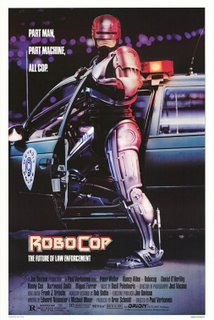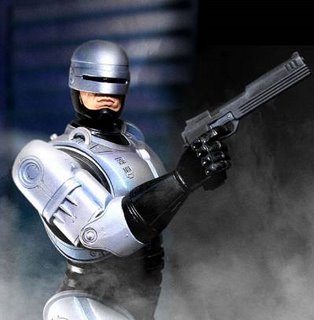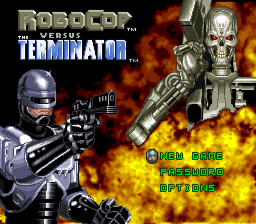
EXCUSE ME, I HAVE TO GO, SOMEWHERE THERE IS A CRIME HAPPENING
RoboCop was released on July 17th, 1987. A thrilling, science fiction and action film, RoboCop is both a social critique and futuristic fight for law and order. Directed by Paul Verhoeven (Basic Instinct, Total Recall, Starship Troopers), the film is an essential eighties movie. In addition, it is an early example of a film's marketing strategy. Robocop’s marketing campaign produced the following entities: a video game, cartoon series, several sequels, action figures, and books.
The film chronicles a rookie policeman named Murphy (Peter Weller), who has recently been transferred to a needy Detroit police department. As a member of the Metro South unit, Murphy is brutally killed and disfigured while busting several violent criminals. This murderous episode spawns the creation of RoboCop. RoboCop is a product of Omni Consumer Products, a large, global firm that controls the city and its law enforcement. The disfigured man, once known as Murphy, becomes an indestructible, mechanized warrior built to enforce the law. RoboCop is “Part Man, Part Machine, All Cop” to qoute the film's tagline.
Although RoboCop follows a violent, action packed narrative of cops and robbers, the most intriguing part of the film is the theme of privatization. Robocop’s world is filled with violent crime, constant drug abuse, staggering unemployment, and visible poverty. These elements produce a squalid and uninhabitable setting for the film. The film's harsh setting criticizes the political idea of privatized government and its effectiveness. The filmmakers purposely used Detroit, known as an industrial metropolis, to display a decaying urban setting filled with run-down factories. This urban, American city is a symbol for the commercial production of machines and other related entities. Therefore, Detroit's automobile idustry provides an ideal setting for a manufactured man machine.
The creation of RoboCop and the dark setting represent the deterioration of American industry and governance. The film uses RoboCop to demonstrate a transitional period within city. Controlled by the Omni Consumer Products Corporation, the industrial setting is a completely privatized entity. All economic enterprises and public utilities that were previously under state ownership are now controlled privately. This cinematic society forecasts some aspects of contemporary American society. For instance, America’s prisons are built and controlled by privatized firms similar to those in the film.
The film's main character, RoboCop, is a suffering, action hero plagued by tragedy. Part human and part machine, he is the product of a multinational corporation’s desire for power and dominance. RoboCop physically transforms from human to machine but is able to retain a psychological idea of his human nature throughout the process. RoboCop exhibits human emotions such as memory retention and a sense of individualism. However, due to his mechanical makeup, most of his actions are cold and emotionless. He is programmed to follow four prime directives: serve the public trust, protect the innocent, uphold the law, and follow all orders from an OCP officer.
RoboCop resembles the creature in Mary Shelley’s Frankenstein. Both characters are physical abnormalities compared to the social atmosphere to which they belong. Furthermore, each character experiences suffering and each is composed of many different parts to form the overall, functioning being. But most of all, each character is capable of devastating acts of violence. RoboCop acts in a gruesome, unforgiving manner while upholding the law. Dr. Frankenstein's monster shows similar traits when murdering his victims.

RoboCop is a highly recommended eighties film. The thematic issues of privatization and dehumanization are powerfully presented despite the action packed, law enforcement narrative. The film demonstrates cinematic and ethical elements to provide an entertaining story. This film will resonate with science-fiction audiences for ages. The costumes and set design establish an intriguing visual environment that resembles the 1980's. RoboCop was so successful that the production company made a RoboCop 2 and 3.
THEMATIC LINKS:
Paul Verhoeven at Internet Movie Database:
http://www.imdb.com/name/nm0000682/
RoboCop versus Terminator comic book:
http://en.wikipedia.org/wiki/RoboCop_vs._The_Terminator

No comments:
Post a Comment